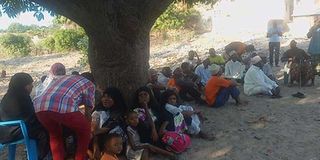Lamu Shifta war squatters want relocation plan halted

Squatters who are victims of the 1960s Shifta war during a meeting on Lamu Island on April 4, 2019. They have rejected a plan by the Lamu County government to resettle them. PHOTO | KALUME KAZUNGU | NATION MEDIA GROUP
What you need to know:
- Lamu East was worst hit by the Shifta war of 1960s.
- In July 2018, the county government started plans to resettle at least 20,000 squatters.
- The Shifta war victims accused the county and national governments of neglecting them.
Over 5,000 squatters in Lamu who were displaced from their land during the Shifta war in the 1960s have rejected a plan by the county government to resettle them and want the ongoing land surveys stopped immediately.
Lamu East was worst hit by the Shifta war with villages like Kiunga, Ishakani, Mvundeni, Mwambore, Rubu, Mkokoni, Kiwayu and Ashuwei bearing the brunt.
In July 2018, the county government started plans to resettle at least 20,000 squatters in the region in the next four years with the Shifta war victims also included in the plan.
IDLE LAND
The plan is to have all idle land in the region identified, demarcated and each squatter allocated land and a title deed.
Various areas where land surveys have been launched in Lamu include Pate, Kiunga, Mwambore, Mokowe, Kiangwe, Kiwayu and Faza.
The objective of the entire resettlement programme is to reduce the already bloated population of squatters and landlessness in the region in the next four years.
STOP SURVEY
But speaking when they convened an urgent meeting in Lamu Town on Thursday, the Shifta war squatters asked the county government to immediately stop the survey of the land intended for resettlement saying they had not been consulted or involved.
They claimed the process is corrupt and is also shrouded in secrecy, suggesting that it is not genuine.
They accused the county and national governments of neglecting them.
Instead, the squatters want the national government to disclose the findings of the Truth, Justice and Reconciliation Commission (TJRC) report that documented the entire war and also implement its recommendations.

Mr Mohamed Mbwana, the spokesman of the squatters, speaks during a meeting in Lamu on April 4, 2019. PHOTO | KALUME KAZUNGU | NATION MEDIA GROUP
TJRC REPORT
Their spokesman Mohamed Mbwana said the TJRC report has never been made public years after the war and that it would only be prudent for the world to know what exactly caused the Shifta war.
Mr Mbwana said the government owes the Shifta war squatters in Lamu an apology for all the years that justice has been delayed.
The squatters have vowed not to allow the resettlement plans by the county government until the national government compensates them for all the losses suffered during the war.
NOT INVOLVED
They wondered why the survey of their villages is being done without their presence or involvement.
“We’re not involved or consulted in the ongoing survey of our lands by the county government. Even us as Shifta war victims have not reached a consensus on what should be done to our lands since no one is there at the moment. The lands are bushy and, therefore, we won’t allow the survey to go on. We’re aware that people want to take advantage of our situation,” said Mr Mbwana.
Another squatter, Mrs Tima Amin, called on the government to have them taken back to their initial villages instead of being resettled elsewhere.
“The government should just rebuild our homes and clear the bushes so that we can just go back to where we lived before the war came. We don’t want a scenario where surveys are being done on our lands while we are absent. We understand that the ongoing survey process is corrupt and not genuine and that’s why we’re demanding it to stop,” said Mrs Amin.





